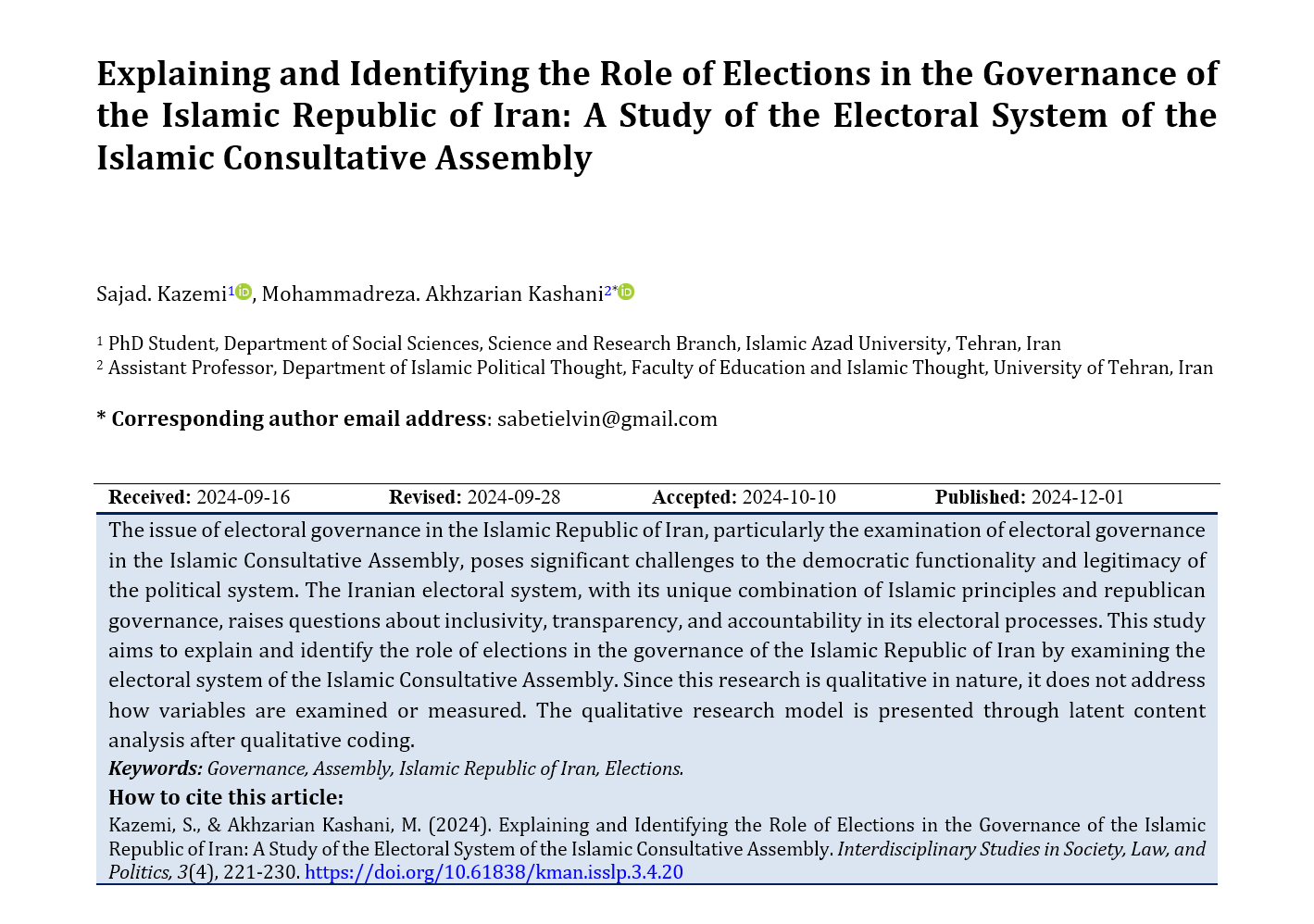Explaining and Identifying the Role of Elections in the Governance of the Islamic Republic of Iran: A Study of the Electoral System of the Islamic Consultative Assembly
Keywords:
Governance, Assembly, Islamic Republic of Iran, ElectionsAbstract
The issue of electoral governance in the Islamic Republic of Iran, particularly the examination of electoral governance in the Islamic Consultative Assembly, poses significant challenges to the democratic functionality and legitimacy of the political system. The Iranian electoral system, with its unique combination of Islamic principles and republican governance, raises questions about inclusivity, transparency, and accountability in its electoral processes. This study aims to explain and identify the role of elections in the governance of the Islamic Republic of Iran by examining the electoral system of the Islamic Consultative Assembly. Since this research is qualitative in nature, it does not address how variables are examined or measured. The qualitative research model is presented through latent content analysis after qualitative coding.
Downloads
References
Ali Pour, H. (2015). The Legal System of Elections and the Right to Vote in the Islamic Republic of Iran. Strategic Studies, 3, 63-88.
Ansari Dezfuli, D. M. (2013). Examining Aspects of the Parliamentary Election System in Light of the 9th Parliament Elections. Constitutional Law, 19, 17.
Bagheri, M., Hossein Zadeh, A. H., & Shojaei, H. (2021). Examining the Impact of Social Trust on Women's Political Participation in Ahvaz Using the Structural Equation Modeling Approach. 8th National Conference on Modern Studies and Research in Humanities, Management, and Entrepreneurship in Iran, Tehran.
Bayi Lashaki, M., & Pishgahi Fard, D. Z. (2009). Analysis of Iranian Electoral Behavior (Case Study: Nowshahr and Chalous Constituency in the 8th Parliamentary Elections). New Perspectives in Human Geography, 3, 93.
Chi, H., Wang, H.-C., & Lin, C.-C. (2012). Knowledge of the Electoral System and Voter Turnout. 16(1), 237-277.
Davoudi, H., Bakhshayesh, A., & Arabiyan, A. (2020). The Role and Position of the Islamic Consultative Assembly in Good Governance. Political Studies, 43-59.
Emam Jom'eh Zadeh, S. J., & Karami Rad, J. (2012). Analysis of Factors Influencing Electoral Behavior with a Focus on Iran. Political Research, 1, 9-36.
Feysari, N., Taheri Fadafan, D., & Bagheri Farsani, M. (2015). Election Management in Iran: Quality and Performance Evaluation. Strategic Policy Research, 13, 9-34.
Jafari Nejad, M., Babanasab, H., & Rabiei, S. (2011). Analysis of Electoral Behavior (Case Study: 10th Presidential Election in the Harris Constituency). Political and International Studies Research, 3(7), 159-206. https://sid.ir/paper/172840/fa
Jahangiri, S. (2018). Examining Barriers to Political Development in Iran (Case Study: Pahlavi II Era). Journal of the History of the Revolution, 2(Third and Fourth Issues), 57-78.
Khorramshad, R. Q. (2013). The Electoral System in the Islamic Consultative Assembly Elections. Contemporary Political Studies,
Rannie, M. (2019). Legal regulations for the general election system in indonesia from the 1955 election to the concurrent election of 2019. Nurani, 20(2), 247-264. https://doi.org/10.19109/nurani.v20i2.6927
Tahan Nazif, H., & Kadkhoda Moradi, K. (2019). Pathology of the Legal System Governing the Electoral Oversight Processes of the Islamic Consultative Assembly in Light of General Election Policies. Public Law Studies, 1127-1148.
Tayo, P. Ethical and Legal Challenges of Election Reporting in Nigeria: A Study of Four General Elections, 1999-2011. https://doi.org/10.4018/978-1-5225-2095-5.ch005






